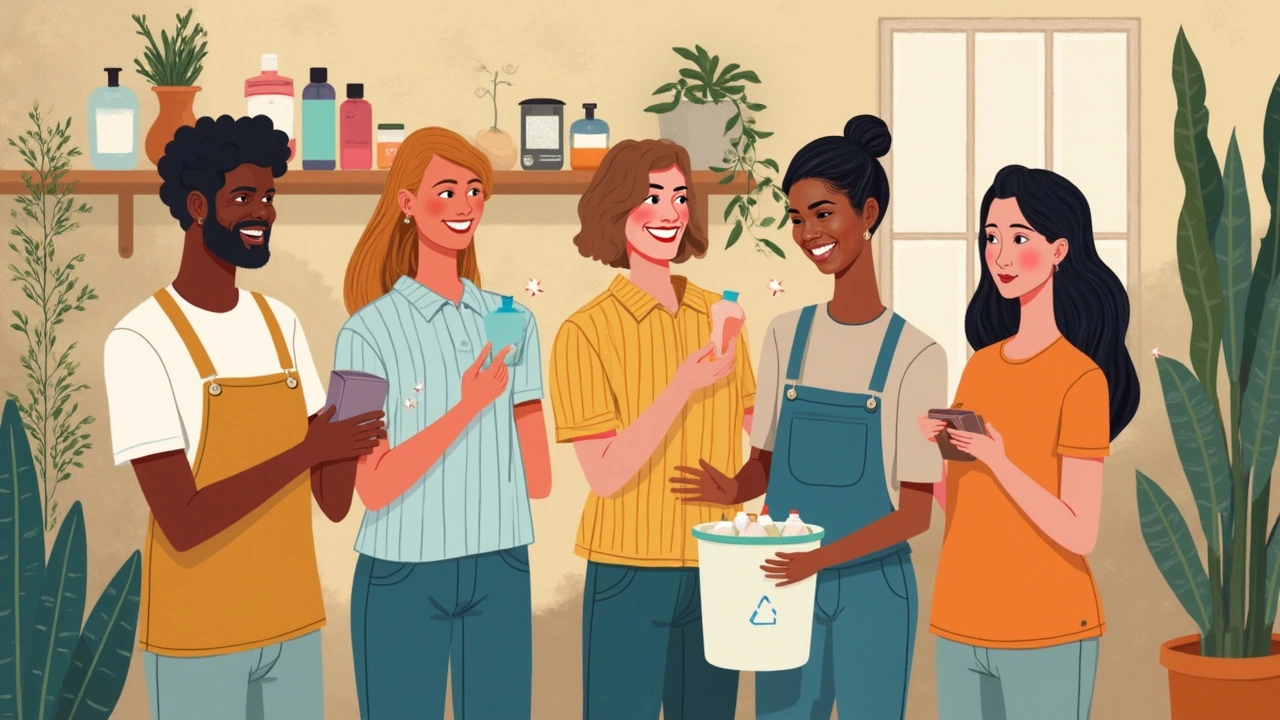Organic Skincare: Why Make the Switch Now?
 May, 29 2025
May, 29 2025
You probably wouldn’t eat something you can’t pronounce, but most of us put mystery chemicals on our skin every day—and our skin absorbs more than we realize. If you flip over your lotion or face cleanser and try to read the ingredients, it’s a recipe for confusion. Parabens? PEGs? Artificial fragrances? It’s honestly wild how much unnecessary stuff sneaks into the products we trust every morning and night.
Switching to organic skincare means swapping out the question marks for real, recognizable ingredients. Think coconut oil, aloe, chamomile, and green tea—stuff that sounds like it belongs in your kitchen, not a chemistry lab. And the cool thing? Your skin often reacts better because nature actually knows what it’s doing.
If you’ve ever wondered why your skin acts up with rashes or breakouts out of nowhere, those harsh preservatives and fake perfumes could be the villains. It’s not just about avoiding irritation; it’s about giving your skin a chance to thrive with gentle, straightforward care. So if you’re curious about going organic, you’re not alone—more people are making the switch, and it’s not just a trend.
- What’s Hiding in Conventional Skincare?
- How Organic Ingredients Benefit Your Skin
- The Real Impact on Health and the Environment
- How to Start Your Organic Skincare Journey
What’s Hiding in Conventional Skincare?
Ever tried reading the back of a drugstore moisturizer? It’s like decoding a science project. The average person uses about nine personal care products daily, which adds up to roughly 126 different ingredients, according to a survey by the Environmental Working Group. Some of these chemicals stick around in your body for a long time, and nobody really wants mystery leftovers building up in their system.
The real problem? A lot of stuff lurking in regular skincare is there for shelf life, texture, or even just for scent. Here are some of the most common ingredients you’ll find:
- Parabens – Used to keep mold and bacteria away, but they can act like hormones in your body and mess with your system.
- Phthalates – Helps products hold color and perfume, but they’re linked to disruptions in your body’s hormone levels.
- Sulfates (like SLS and SLES) – These make things foamy, but they strip away natural oils and leave skin dry.
- Formaldehyde and Formaldehyde-releasing preservatives – These are used to prevent bacteria, yet they’re classified as human carcinogens.
- Artificial fragrances – Often just labeled as "fragrance" or "parfum," these can hide hundreds of secret chemicals that trigger allergies and skin issues.
If that’s not enough to raise eyebrows, get this: in the U.S., the FDA has banned just 11 chemicals from cosmetics. Europe? Over 1,300. That’s a massive gap in safety rules and means way more questionable stuff is allowed in American skincare.
| Ingredient | Main Purpose | Potential Risks |
|---|---|---|
| Parabens | Preservative | Hormone disruption, possible links to cancer |
| Sulfates | Foaming agent | Dryness, irritation, strips natural oils |
| Phthalates | Solvent, softener | Hormone disruption, reproductive issues |
| Formaldehyde | Preservative | Carcinogen, allergy trigger |
| Artificial fragrance | Scent | Allergies, skin sensitivity |
Dr. David Suzuki, a respected environmental activist, summed it up like this:
“With cosmetic ingredients, it’s always ‘buyer beware.’ The long-term effects of many chemicals haven’t been fully studied, and regulation hasn’t caught up with science.”
So when people talk about switching to organic skincare, it’s really not just hype. It’s about dodging a laundry list of stuff that’s not doing your skin—or the rest of you—any favors.
How Organic Ingredients Benefit Your Skin
Organic skincare isn’t just a buzzword. Real, organic stuff—think plant oils, natural extracts, and pure butters—actually helps your skin out in a bunch of ways. You get more nutrients, fewer irritants, and less risk of any long-term health drama.
Most organic ingredients are loaded with vitamins and antioxidants. For example, rosehip oil is packed with vitamin C, which helps your skin look brighter and bounce back from sun damage. Aloe vera soothes redness and irritation. Jojoba oil is a winner if you’re fed up with dryness or super oily spots, because it balances out oily and dry patches without clogging your pores. These ingredients don’t just sit on your skin—they get in there and help repair and protect.
One big thing people love about organic products is what they leave out: No parabens, phthalates, sulfates, or fake fragrances. Researchers at the University of California found parabens in 99% of urine samples in a 2019 study. That means all those chemical-based creams and lotions don't just stay on top—they end up inside our bodies. Not cool.
Here’s a quick rundown of how some common organic ingredients can upgrade your routine:
- Organic skincare keeps your skin barrier strong and balances natural oils.
- Fewer chances of allergic reactions, since they’re free from harsh chemicals and artificial scents.
- Gentle enough for sensitive or acne-prone skin—no more mystery breakouts.
- Loaded with real vitamins and healthy fats for long-term skin health.
| Ingredient | Main Skin Benefit | Natural Source |
|---|---|---|
| Aloe Vera | Soothes & calms irritation | Aloe plant |
| Rosehip Oil | Brightens & repairs | Rosehip fruit |
| Green Tea Extract | Fights free radicals | Green tea leaves |
| Shea Butter | Deep hydration | Shea tree nuts |
| Jojoba Oil | Balances oil | Jojoba seeds |
If you’re someone who’s fed up with looking at ingredient lists that read like a science project, it makes sense to want products where you know what you’re getting. Your skin doesn’t just feel better—it’s supported and healthier from the inside out.

The Real Impact on Health and the Environment
Let’s be honest—what you put on your skin doesn’t just stay there. Researchers have found that our bodies can actually absorb up to 60% of what we apply on our skin. That means synthetic chemicals and preservatives used in non-organic products can end up deeper than we’d like, in our bloodstream and even organs. For example, parabens (the cheap go-to for shelf life) have been detected in urine samples and even in breast tissue, causing concerns about hormone disruption.
If you care about more than just your own health, it’s good to know that conventional beauty products make a mess for the planet too. Microbeads (remember those in scrubs?) used to be everywhere, and they’re still polluting our oceans because they don’t break down. Chemical sunscreens can wash off in water and harm coral reefs. Even old-school rinsing sends sulfates, silicones, and synthetic fragrances down the drain, where they impact soil and wildlife.
Organic skincare brands do things differently. They use plant-based ingredients grown without pesticides, which means fewer chemicals end up in the earth and our water. Packaging tends to be more eco-friendly too—lots of brands now use glass bottles or recyclable cardboard instead of plastic.
- Organic farming produces up to 60% less greenhouse gas emissions compared to conventional farming.
- Pesticide-free ingredients are safer not only for your skin, but also for farm workers who avoid toxic exposure.
- No microplastics, SLS, or chemical-heavy runoff means aquatic life gets a break.
- Studies from the Environmental Working Group found that people who switched to organic skincare cut their synthetic chemical exposure dramatically.
If numbers help make things clearer, here’s a quick comparison of organic vs. non-organic products:
| Organic Skincare | Non-Organic Skincare | |
|---|---|---|
| Pesticides | None used | Commonly used |
| Environmental Impact | Lower | Higher |
| Microplastics | None | Often present |
| Packaging | Usually recyclable | Mostly plastic |
| User Exposure to Harsh Chemicals | Minimal | High |
Switching isn’t just about you—every bottle you choose helps cut down on chemical waste and makes a small but real difference in the environment. That’s the kind of self-care that actually pays off for your health and the planet at the same time.
How to Start Your Organic Skincare Journey
Switching up your routine doesn’t need to be overwhelming or expensive. The trick is to keep it simple and focus on changes that really make a difference. Don’t toss out everything in your bathroom at once—just pay attention to your skin’s most-used products first.
Start by swapping out the items that cover the largest areas of your body. For most people, this means body lotion, face cleanser, and sunscreen. Your skin absorbs more from these products just by the amount and frequency of use. The Environmental Working Group (EWG) reports that, on average, women use 12 different personal care products daily, exposing themselves to around 168 unique ingredients every day. That’s a lot of room where little switches can make a big impact.
- Read the ingredient list: If you can’t pronounce it or wouldn’t put it in your smoothie, maybe skip it on your skin.
- Look for certification: Labels like USDA Organic or Ecocert mean the product follows strict ingredient and process guidelines.
- Patch test: Just because it’s natural doesn’t mean you can’t react. Test a small amount behind your ear or on your wrist first.
- Prioritize basics: Focus on products like moisturizer and cleanser before worrying about extras like masks and serums.
Certain ingredients really do stand out in organic skincare. Aloe vera, jojoba oil, shea butter, green tea, and rosehip oil are superstars that moisturize and calm skin without clogging pores. And if you want something a little fancy, try products with chamomile or calendula—these have a solid rep for soothing irritated skin.
| Swap This | For This Organic Option | Why? |
|---|---|---|
| Artificial fragrance lotion | Shea butter lotion with essential oils | Fewer allergens, less irritation |
| Foaming face wash with sodium lauryl sulfate | Cream cleanser with aloe and coconut oil | Kinder to your skin barrier |
| Conventional sunscreen | Mineral sunscreen with zinc oxide | No chemical UV filters |
When you find something you love, stick with it for at least a month before mixing in new products. Your skin needs time to adjust, even to the good stuff. If the price has you nervous, remember that a lot of organic ingredients go a long way—most are highly concentrated so you need less.
Don’t forget to check reviews, especially from folks who have a similar skin type. And if you’re ever in doubt, ask for travel sizes or samples before splurging on the full size.
